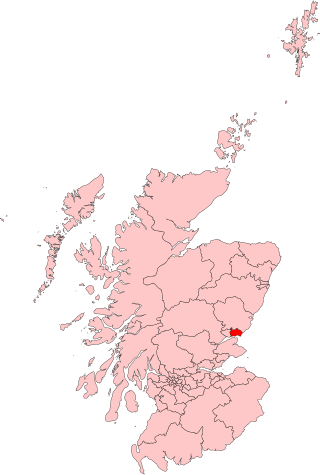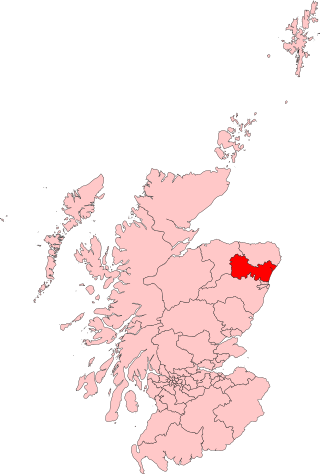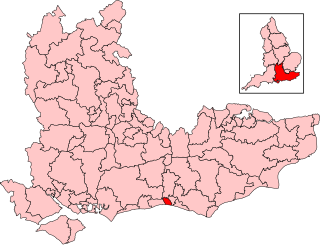
Aberdeen City Council is the local authority for Aberdeen City, one of the 32 council areas of Scotland. In its modern form it was created in 1996. Aberdeen was formerly governed by a corporation from when it was made a burgh in the twelfth century until 1975. Between 1975 and 1996 the city was governed by City of Aberdeen District Council, a lower-tier authority within the Grampian region.

Dundee East was a constituency of the House of Commons of the Parliament of the United Kingdom. Created for the 1950 general election, it elected one Member of Parliament (MP) by the first-past-the-post voting system.

Aberdeen South is a burgh constituency of the House of Commons of the Parliament of the United Kingdom which elects one Member of Parliament (MP) by the first-past-the-post system of election.

Aberdeen North is a burgh constituency of the House of Commons of the Parliament of the United Kingdom and it elects one Member of Parliament (MP) by the first past the post system of election. It was first used in the 1885 general election, but has undergone various boundary changes since that date. The seat has been held by Kirsty Blackman of the Scottish National Party since 2015.

Gordon was a county constituency of the House of Commons of the Parliament of the United Kingdom (Westminster), which elected one member of Parliament (MP) by the first past the post system of election. The constituency was first contested at the 1983 UK general election; and underwent boundary changes throughout its existence.

Bedford is a constituency represented in the House of Commons of the UK Parliament since 2017 by Mohammad Yasin of the Labour Party.

Hove and Portslade is a borough constituency in East Sussex represented in the House of Commons of the UK Parliament since 2015 by Peter Kyle of the Labour Party, who currently serves as Secretary of State for Science, Innovation and Technology in the government of Keir Starmer.
Glasgow Govan was a parliamentary constituency in the Govan district of Glasgow. It was represented in the House of Commons of the Parliament of the United Kingdom for 120 years; from 1885 until 2005, returning one Member of Parliament (MP) elected by the first-past-the-post system.

The first elections to the new local authorities established by the Local Government Act 1972 in England and Wales and the new Northern Ireland district councils created by the Local Government Act 1972 took place in 1973. Elections to the existing Greater London Council also took place.

The 1951 Australian federal election was held in Australia on 28 April 1951. All 121 seats in the House of Representatives and all 60 seats in the Senate were up for election, due to a double dissolution called after the Senate rejected the Commonwealth Bank Bill. The incumbent Liberal–Country coalition led by Prime Minister Robert Menzies defeated the opposition Labor Party led by Ben Chifley with a modestly reduced majority, and secured a majority in the Senate. This was the last time the Labor party ever held a Senate majority. Chifley died just over a month after the election. This was the sixth and last federal election prior to the death of George VI a year later.
The 2008 Glasgow East by-election was a by-election for the UK Parliamentary constituency of Glasgow East which was held on 24 July 2008. The election was triggered when, on 30 June 2008, the sitting MP David Marshall stood down due to ill health.

The 2007 Pendle Borough Council election took place on 3 May 2007 to elect members of Pendle Borough Council in Lancashire, England. One third of the council was up for election and the Liberal Democrats stayed in overall control of the council.

Elections for the Scottish district councils were held in 1980.
Hertfordshire County Council elections was held on 1 May 1997, with all 77 seats contested. The Council remained under no overall control. The Conservatives formed the largest political group, but the Labour and Liberal Democrat groups formed a coalition to run the council.

The 2012 Aberdeen City Council election took place on 3 May 2012 to elect members of Aberdeen City Council. The election used the 13 wards created as a result of the Local Governance (Scotland) Act 2004, with each ward electing three or four Councillors using the single transferable vote system form of proportional representation, with 43 Councillors elected.
Local elections were held in Scotland in May 1969. The turnout was one of the lowest on record, due to heavy rain and television coverage of the Scotland-Northern Ireland International football match at Hampden Park, Glasgow.

An election to the Aberdeen Corporation was held on 1 May 1973, alongside municipal elections across Scotland. 12 of the corporation's 36 seats were up for election.

Elections to Aberdeen City Council took place on 5 May 2022 on the same day as the 31 other Scottish local government elections. As with other Scottish council elections, it was held using single transferable vote (STV) – a form of proportional representation – in which multiple candidates are elected in each ward and voters rank candidates in order of preference.

An election to the Aberdeen Corporation was held on 3 May 1949, alongside municipal elections across Scotland. 12 of the corporation's 37 seats were up for election.

An election to the Aberdeen Corporation was held on 1 May 1951, alongside municipal elections across Scotland. 14 of the corporation's 37 seats were up for election.
















